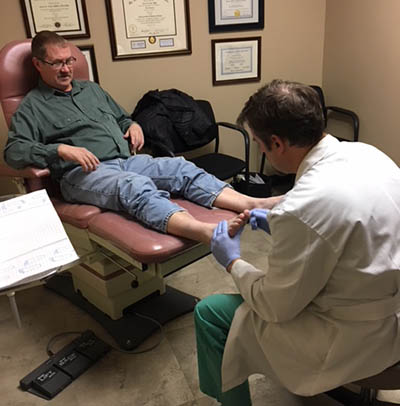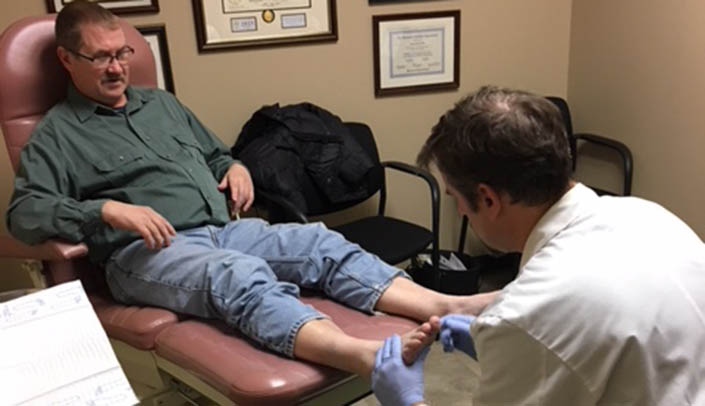 |
After Michael Clayton met with first-year medical students, the students helped him get new shoes, supplies and even facilitated a visit to the podiatrist. |
Kelly Caverzagie, M.D., associate dean for educational strategy: One of the core tenets of the curricular redesign is to introduce health system sciences . . . patient safety, quality, value-based care, social determinants of health and population-based medicine. Paying attention not just to the disease, but to resources, risks, barriers that patients have that impact their disease.
Elsa Parr, M1 student: There was one rheumatoid arthritis (RA) patient who did not have the means necessary to help out with his RA. In a fair world, he would be able to afford medication and special shoe inserts, but options that we might prescribe were not options for him.
Dr. Caverzagie: As early as the first week of medical school, we’re trying to get (students) to understand that 60 to 80 percent of the health of a patient is dependent on their circumstances. So, what social and economic circumstances affect a patient? What else needs to be considered?
Michelene Hearth-Holmes M.D., assistant professor of rheumatology: His feet. We had him take his shoes off. He said he felt like he was walking on rocks all the time.
Parr: We can talk about living with RA, but he brought it to life for us. He put a face on it.
Dr. Hearth-Holmes: His rheumatoid arthritis was so active. Swollen joints everywhere. The students asked, Why isn’t he on other therapies? Why doesn’t he have inserts for his shoes? It was all financial…Part of being a physician is realizing, just because we have all of these drugs, not every patient can pay for that. A couple of students asked if they could get him shoe inserts and better shoes. I’ve never had a student ask me that in 30 years.
The students used a payment-sharing app to crowd-fund, in hopes of buying the patient new, better shoes, and some inserts.
Dr. Hearth-Holmes: He resonated with them. One of the joys of being a physician is taking care of someone over time, getting to know someone as a person. They got to know him as a person.
Dr. Caverzagie: The hope is they approach all of their patients in this way.
Parr: The goal was $200 to get some inserts and a couple pairs of shoes. We reached that in about half an hour.
The students raised just over $1,000 in 48 hours. Dr. Hearth-Holmes bought the patient two pairs of shoes, winter clothes, bus passes and took him to the podiatrist.
Dr. Hearth-Holmes: He was so appreciative. He came yesterday with a thank you card. Very sweet.
But just as every patient does not have resources for treatment, the students also realized that not every patient gets their own fundraiser.
Dr. Caverzagie: The next step, as a practicing physician, is to understand the role everybody on the team plays in helping patients. It might be to partner with the pharmacist to find cheaper medications, or with a nurse, social worker or community health worker to locate important resources. There’s a whole team of people that can help.
Together, these physicians-in-training saw the true meaning of compassionate medicine. “I enjoy hearing about this every time,” Dr. Caverzagie said.

To echo Dr. Caverzagie, I also enjoy hearing about this. Congrats to our M1 students. YOU are making a difference.
Wonderful.
That has to be one of the best heart warming stories I have heard for crowd source funding! Kudos for thinking of that for this patient!
This is a great story. I love hearing about how medical students connect with their patients.
I love hearing stories like this. The kindness in helping this patient is absolutely wonderful.
The compassion of these M1 students and the extra steps taken by them in the care of their patient confirms they are in the right profession. A curriculum change certainly comes with challenges, but this is definitely a positive result! Keep up the great work students and UNMC! #proudM1parent